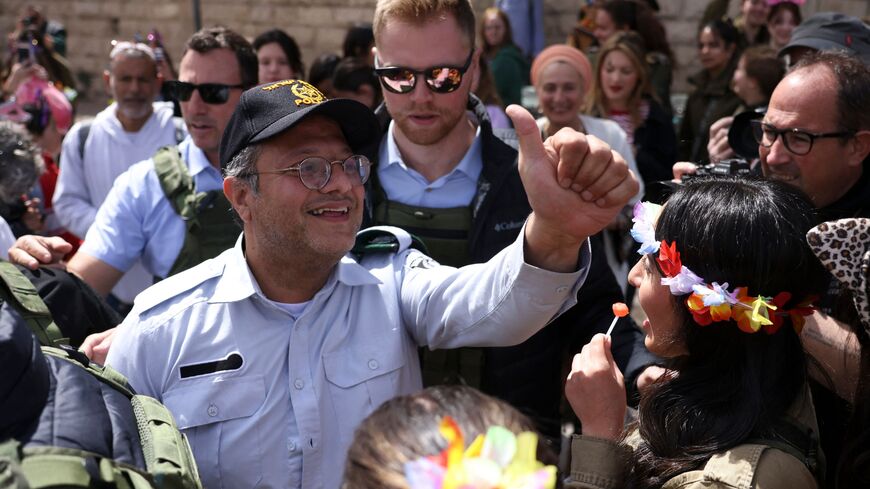TEL AVIV — Israeli National Security Minister Itamar Ben-Gvir is pressing ahead with his controversial plans to establish a National Guard corps under his command, despite opposition from some in the Israeli security establishment. Ben-Gvir wants to create the guard in order to quell any future violence against Jews from Israel's Arab community and establish a security force that he — and not his critics — would control.
A campaign promise
Ben-Gvir's desire to create a National Guard has its roots in the communal violence that occurred between Jews and Arabs in Israel in 2021. Operation Guardian of the Walls in May of that year is still fresh in the nation’s collective memory. At the time — toward the end of Netanyahu’s last government — Israel’s conflict with Hamas led to unrest among the Israeli Arab population living in mixed cities. There were bitter clashes with the security forces but also attacks against Israeli civilians, some of them deadly. Synagogues were attacked in Lod, and a restaurant was burned down in Acre.
This “national trauma” was a watershed moment for Israel, and led many Israelis to believe that they need a new approach to keeping civilians safe.
In the spring of 2022, the power-sharing government led by former Israeli Prime Minister Naftali Bennett and then former Prime Minister Yair Lapid contended with a new wave of violence. This time, several major attacks were perpetrated by Israeli-Arab assailants living within the Green Line. In this context, Bennett approved shortly before he left office the creation of a National Guard.
As it was originally conceived, this National Guard was to be subject to the Israel Police. With a budget of 40 million shekels ($11 million), it was intended to provide a rapid and effective response to disorderly events in several locations simultaneously. It was also to ensure that the roads remained open in emergency situations and provide assistance to the regular security forces as needed.
The proposal essentially amounted to a new reserve force, similar to the army's reserves. This new organization was to include two brigades of border police, a few border police reserve units and 1,000 volunteers who had served in the past in combat units, per Bennett's plan.
But all the violence played into the hands of Ben-Gvir, who exploited the turmoil to lash out daily at the government. Ben-Gvir pushed for his vision of a National Guard under his control during his election campaign last year. The promise to set up such an organization, alongside other pledges for security measures, made Ben-Gvir the rising star of the right in the last election. He managed to convince hundreds of thousands of Israelis, including soldiers and other members of the security forces, that he had the magic formula to restore governability to the citizens of Israel.
As a result of his meteoric rise, Ben-Gvir demanded and received the Ministry of National Security portfolio following the November 2022 elections. Netanyahu had no choice to award the ministry to Ben-Gvir if he was to return to power. Netanyahu conceded to many of Ben-Gvir’s demands, including the creation of a National Guard directly under Ben-Gvir's authority.
Opposition among the security establishment
In the weeks following the last elections, Netanyahu was not in a hurry to pass the National Guard legislation. Then, with the political and social upheaval that his judicial reform program elicited and the ensuing political instability, Netanyahu was finally forced to keep his promise to Ben-Gvir so as not to jeopardize his coalition majority. On April 2, Netanyahu put forward the National Guard plan in the Knesset.
It did not go smoothly. There was overwhelming opposition to the plan from Attorney General Gali Baharav-Miara and Shin Bet Director Ronen Bar, among others — plus the opposition. They argued that this was a dangerous move that threatened the independence of the long-established Israel Police by forcing it to contend with a competitor. The formation of a police force under the direct control of an extremist and unpredictable Ben-Gvir is seen by many in Israel as akin to the creation of a private police force or even a militia.
Addressing the Galilee College, Israel Police Commissioner Yaakov Shabtai later said that he warned Ben-Gvir that establishing a new security organization separate from the police would “bring ruin to individual security, waste resources and lead to the dismantling of the Israel Police from the inside.”
Tempers also flared in the April 2 Cabinet meeting that approved the creation of a National Guard. According to Haaretz, Minister of Agriculture Avi Dichter, a former director of the Shin Bet, told Ben-Gvir directly that the move was synonymous to declaring no confidence in the police and the Shin Bet. Minister of Intelligence Gila Gamliel also expressed her reservations, warning that the move threatened the authority of the IDF and would result in a competition over authority among the different security forces.
What's next
Nevertheless, the decision received government approval. Ben-Gvir must now put together a committee that will formulate an outline listing the National Guard’s areas of authority and present it to the government within 90 days. Even after the committee submits its proposals, these will still need to be approved by the Knesset and Netanyahu's Cabinet.
The decision also does not determine whether the new force, though established by the Ministry of National Security, will be under the direct control of Ben-Gvir, the police commissioner or someone else. Haaretz reported that according to the proposal approved by the Cabinet, the committee will only discuss this “after hearing from the commissioner of police and all other professionals in this area.”








